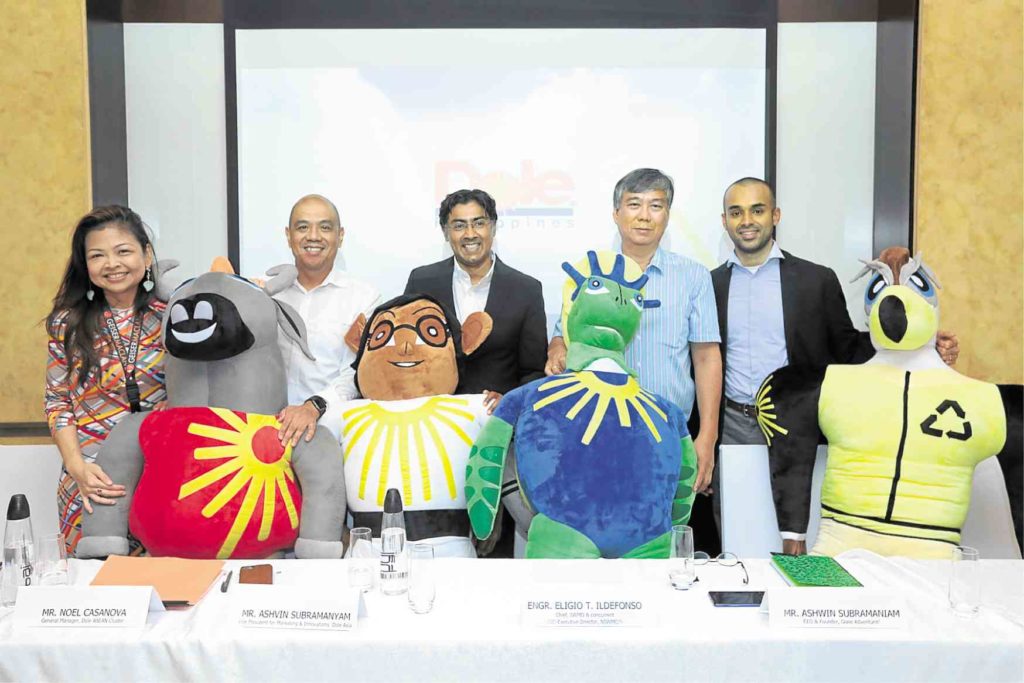
(From left) Amor Maclang of GeiserMaclang, Dole Asean Cluster general manager Noel Casanova, vice president of Dole Asia Marketing and Innovations Ashvin Subramanyam, DENR Solid Waste Management Division Chief and concurrent OIC-Executive Director for National Solid Waste Management Commission-Secretariat Eligio Ildefonso, and Gone Adventurin’ CEO & founder Ashwin Subramaniam with the Sunshine Heroes plushies: Carabao, Tarsier, Pawikan and Agila
Despite the Philippines’ policies and repeated campaigns to reduce, reuse, and recycle, Filipinos, sadly, still seem slow to adopt a “recycling culture,” especially at home.
It’s an issue which Dole Philippines, through a recently launched sustainability initiative, hopes to address with the help of a group of people whom they believe have the most power to influence their families: the youth.
Called “Sunshine Heroes,” the project is focused on engaging schoolchildren and instilling within them the habit of recycling and enable them to “change mindsets about proper waste management,” said Ashvin Subramanyam, Dole Asia vice president for marketing and innovations.
“Recycling is a habit that needs to form early. We need to teach kids that all the trash they see lying around our streets and clogging our waterways are there because we need more recycling and less trash,” Subramanyam added.
Partnering with Dole on Sunshine Heroes is local environmental group Mother Earth Foundation and Gone Adventurin’, a Singapore-based advisory firm which helps companies, government agencies and nongovernment organizations integrate sustainability practices into their core business, particularly when it comes to the issue of postconsumer waste.
The campaign involves the creation of materials recover facilities (MRFs) in selected Metro Manila schools where students will be requested to bring their respective household’s recyclable waste to school, such as paper, cardboard, bottles, and tin cans.
The accumulated trash will then be sold to local junk shops or recyclers, and the money generated from sales will benefit school programs.
“We’re working on two aspects: one is behavior change, and the other is to make sure the program is financially self-sustaining—that the money that school generates from the waste will eventually cover the cost of operating [the MRFs]. If that happens, it’ll be a bonanza,” said Subramanyam.
The campaign has been rolled out in five pilot schools: Potrero Elementary School and Potrero National High School in Malabon City, and Masambong Elementary School, Sergio Osmeña Sr. High School, and Holy Spirit Elementary School in Quezon City.
Subranayam said Dole and its campaign partners were positive that more schools will adopt the project once they see how it can make a lasting impact on waste management nationwide.
Asked if Dole has plans of working with other institutions, such as hospitals, Subramanyam said: “Movements of this kind will achieve their true power when they move beyond the starting ecosystem. Could we involve other entities in the future? I don’t see why not. However, we need to get the design and operational landscape correct.”
The Sunshine Heroes initiative will also include a series of educational workshops and forums on recycling to help the students of participating schools understand the relevance of such program on the environment.
To further engage students, Dole came up with characters inspired by endemic creatures here in the Philippines: the carabao, the Philippine Eagle, the pawikan, and the tarsier.
These characters—brought to life as huge plush toys made by social enterprise Plush & Play—respectively represent the elements of the ecosystem that Dole Philippines’ hopes to protect through its waste recycling initiative: land, air, water, and trees.
“Public awareness and participation are vital keys to successful waste management measures,” said Subramanyam. “For us at Dole Philippines, recycling is all about embracing the idea of sustainability as a way of life and a sustained advocacy. By educating and engaging our youth, we hope that can help us champion recycling and, in the long run, build environmentally-responsible Filipino households.”

